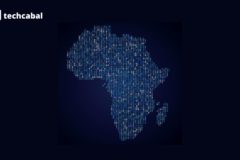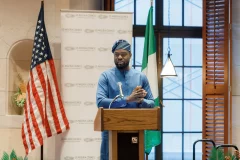
IN PARTNERSHIP WITH


Good morning ☀️ ️
How good was the pandemic to South Africa’s e-commerce space?
According to a research firm, South Africa’s e-commerce sales grew by 66% last year to bring in more than R30 billion ($2.2 billion). That’s more than double its 2018 numbers.
In today’s edition:
- My Life in Tech
- Nupe Energy
- Facebook meets South Africa’s Government
- Ethiopia’s mobile money decision
Seerbit’s Omoniyi Kolade wants financial inclusion for all Africans

Everyone talks about the moment they knew what they wanted to do with their lives.
For some people this moment comes very early – an engineer may tell you it was the first time she ever saw LEGO bricks as a kid. For some others, it comes at the cusp of adulthood, just as adolescence starts to fade.
The former is where Omoniyi falls. His realisation came sometime during his penultimate year in the university.
This “knowing” happened during the Students Industrial Work Experience Scheme (SIWES) program – which is basically compulsory work experience in the year before your final year at university in Nigeria.
During this time he worked with a startup that helped set up networks for former banking giant Oceanic Bank. During his time there, he discovered interesting telecom solutions that were only available or provided by foreign companies. He wanted to replicate those solutions for the Nigerian market.
In this week’s edition of My Life In Tech Edwin shares the story of Kolade Omoniyi who is making a difference in the world of payment.
Increase your online sales with a Paystack Storefront – a free, beautiful seller page that helps you bring creative ideas to life.
🏾 Learn more at paystack.com/storefront
Nupe Energy is turning gas cylinders into connected devices

According to a World Health Organisation (WHO) study, if a person inhales smoke while cooking breakfast, lunch and dinner, it is equivalent to smoking between three and 20 packets of cigarettes a day.
Over half of the world’s population still cooks over open fires. In Nigeria, it’s worse as only 10 million have access to liquefied petroleum gas (LPG) cylinders out of its 200 million population.
Nupe Energy is a renewable energy startup setting out to tackle this problem.
Nupe Energy’s proposed solution to Nigeria’s over open fire problem is an LPG cylinder smart meter that intelligently controls gas flow, monitors cylinder fuel level remotely and facilitates gas purchase. The device, aptly named NUGAS, uses different cellular networks (2G/GSM/GPRS) to display LPG volume and prompt delivery through the cloud.
In a conversation with TechCabal, the Nupe Energy team talk about the product and its progress since inception.

Branch is offering the easiest way to get loans without late payment fees, accrued interests or roll over charges.
Borrowing and paying back to banks, friends or family doesn’t give you the same privileges if you delay with your loan repayment. But this isn’t us because we’re Branch!
Too good to be true? Get the app here!
Opportunities
Deepfake Africa Challenge: In a bid to raise awareness about deepfake media, tools, and ethics on the African continent, AI Expo Africa in collaboration with Wesgro Film and Media African Data Science platform Zindi has launched a Deepfake Africa Challenge.
The objective of the challenge is to create convincing deepfakes to highlight the power of this synthetic media.
Interested? Apply here. Application closes on July 30th.
Startup Cafe Africa accelerator programme: Ghana-based Startup Cafe Africa has launched an accelerator programme to help startups from across Africa disrupt their markets.
Interested? Apply here. Application closes on May 30th.
Event

On Friday, May 21 at 11 am, we will be hosting the 3rd episode of Digital Identity Matters with Babs Ogundeyi, Co-founder, Kuda; Dayo Ademola – Managing Director (Nigeria), Branch International; and Esigie Aguele – Co-founder/CEO, VerifyMe.
Babs, Dayo and Esigie will be discussing how seamless customer onboarding can help fintechs and banks grow very quickly.
They will try to answer the following questions: Why should fintechs and banks integrate eKYC into their customer onboarding processes? What mistakes should they avoid when trying to acquire customers? What can banks learn from fintechs about customer onboarding?
Digital Identity Matters is brought to you in partnership with VerifyMe.
Note: By clicking on the registration link for this event, you’ve indicated interest in the event and will get an invite to attend. To opt out, please ignore the invite.
Facebook to meet South Africa’s Parliament

South Africa’s 2021 local elections are fast approaching and the government has invited Facebook to discuss concerns about misinformation.
“Facebook often tailors plans for countries ahead of elections to guard against harmful misinformation, We would like to see the same done for South Africa.” a member of the parliament said.
The meeting will take place on the 25th of May.
But it doesn’t end there.
The South African parliament sent similar invitations to other big tech giants, Google and Twitter.
Why it matters: In January, the Ugandan government shutdown social media two days before the election. African leaders are getting more aware of the influence of social media networks during elections. It’s only a matter of time before every other African country requests for such meetings.
Ethiopia’s state telecoms monopoly launches mobile money service

“This decision has cost us a high price.”
Two weeks ago, Ethiopia received bids for telecommunications licences from MTN Group and a consortium led by Vodafone Group. What we weren’t aware of was that it had excluded mobile money from the terms of the licenses.
This decision, according to Prime Minister Abiy Ahmed, meant the government had to give up about $500 million in license fees.
Huh, that doesn’t sound right
Well, it doesn’t, until we heard that Ethiopia’s sole mobile operator, Ethio Telecom, launched a mobile phone-based financial service. Basically, Ethiopia wants to keep mobile money run by the state.
Back story: At the moment, Ethiopia has only one mobile telecommunication operator, Ethiotel. Managed by the government, Ethiotel has since been Ethiopia’s sole telecoms operator, but recently they decided to give other players a chance to partake in Ethiopia’s untapped telecom market.
About the new mobile phone-based financial service
The new service, telebirr, will allow users to send and receive money, deposit or take out cash at appointed agents, pay bills to various merchants and receive money transfers from abroad. It’s expected to make a difference in Ethiopia where the banking system is seen as inefficient with 19 commercial banks serving a population of about 115 million. Ethio Telecom said it had 1,600 agents with plans to increase to 15,000 within a year.
Zoom out: According to a recent study, only three out of hundred individuals in Ethiopia used a bank account to receive government payments. Financial inclusion is low in Ethiopia and mobile money is the perfect medium to bridge the gap.
I can understand why the Ethiopian government wants to maintain control of the mobile unit. In 2020, the number of registered mobile money accounts grew by 12.7% globally to 1.2 billion. Sub-Saharan Africa added 43% of all new accounts – the most users last year.
The one question I have though is: will keeping competition out of Ethiopia’s mobile money market be beneficial in the long run?























